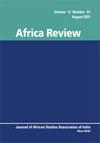From resource curse to institutional incompatibility: a comparative study of Nigeria and Norway oil resource governance
IF 0.5
Q4 AREA STUDIES
引用次数: 3
Abstract
ABSTRACT This article seeks to address a policy quandary: despite Nigeria’s history of oil exploitation since 1956 and institutionalization of the Nigeria Extractive Industry Transparency Initiative (NEITI) in 2004, why has the country not been able to address the resource wealth–poverty dilemma? Is it that the EITI’s governance model is too Western to address Nigeria’s resource curse? It has been established that a country’s propensity to integrate EITI principles in the oil industry is largely dependent not only on the existence of institutions, but also on the level of institutional development. Norway and Nigeria both created policy and regulatory systems. Norway’s more competent administrative structures grew into a self-regulatory system but, by contrast, Nigeria’s indigenous civil service never developed institutional arrangements sufficient to integrate the oil industry into the entire national or regional institutional framework. Considering these historical and contextual differences between Nigeria and Norway, this article employs ‘stakeholder analysis’ to construct a framework of ‘thinking’ regarding how the oil sector could be effectively governed in Nigeria (Figure 7), a country with a robust civil society but a complex political system: in such countries, evolution of what I call a ‘self-reinforcing system of institutional incompatibility’ is inevitable, but institutionalization of foreign models such as EITI is often difficult to achieve.从资源诅咒到制度不相容:尼日利亚与挪威石油资源治理比较研究
摘要本文旨在解决一个政策难题:尽管尼日利亚自1956年以来一直有石油开采历史,并于2004年将尼日利亚采掘业透明度倡议(NEITI)制度化,但为什么该国未能解决资源财富-贫困困境?是不是EITI的治理模式过于西化,无法解决尼日利亚的资源诅咒?已经确定的是,一个国家将EITI原则纳入石油工业的倾向在很大程度上不仅取决于体制的存在,而且取决于体制发展的水平。挪威和尼日利亚都制定了政策和监管体系。挪威较有能力的行政结构发展成为一种自我管理制度,但相比之下,尼日利亚本国的公务员制度从未发展出足以将石油工业纳入整个国家或区域体制框架的体制安排。考虑到尼日利亚和挪威之间的这些历史和背景差异,本文采用“利益相关者分析”来构建一个关于尼日利亚如何有效治理石油部门的“思考”框架(图7),尼日利亚是一个拥有强大公民社会但政治制度复杂的国家。在这些国家,我所说的“制度不相容的自我强化系统”的演变是不可避免的,但像EITI这样的外国模式的制度化往往很难实现。
本文章由计算机程序翻译,如有差异,请以英文原文为准。
求助全文
约1分钟内获得全文
求助全文
来源期刊

Africa Review
AREA STUDIES-
CiteScore
1.80
自引率
12.50%
发文量
22
期刊介绍:
Africa Review is an interdisciplinary academic journal of the African Studies Association of India (ASA India) and focuses on theoretical, historical, literary and developmental enquiries related to African affairs. The central aim of the journal is to promote a scholarly understanding of developments and change in Africa, publishing both original scholarship on developments in individual countries as well as comparative analyses examining the wider region. The journal serves the full spectrum of social science disciplinary communities, including anthropology, archaeology, history, law, sociology, demography, development studies, economics, education, gender studies, industrial relations, literature, politics and urban studies.
 求助内容:
求助内容: 应助结果提醒方式:
应助结果提醒方式:


